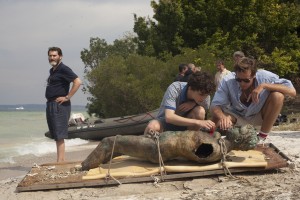FORUM: REALISTIC AND SURREAL
The 47th Berlinale Forum strand allegedly offers the most daring and challenging fare of the festival often featuring films that are ethnographic, political and experimental in nature and where the landscape frequently takes on a leading role.
This year focuses on South and Latin American films. Davi Pretto’s narrative feature Rifle sets out for the endless plains of the Brazilian south to stage a modern Western there. A taciturn former soldier is employed to guard a small landholder’s estate. But when an agricultural company seeks to buy up the land, he reacts in truly drastic fashion.
Peruvian brothers Alvaro und Diego Sarmiento find stunning images to convey the leisurely flow of life in a verdant river landscape in Río Verde. El tiempo de los Yakurunas (Green River. The Time of the Yakurunas) exploring the daily routines of the indigenous inhabitants of Peru’s Amazon region.
In Casa Roshell, Chilean director Camila José Donoso assembles a portrait of a most unusual institution in the Mexican capital, a place where men learn to be women during the day, before the parties get going at night. All manner of boundaries blur in this tiny utopia: between gay, straight and bi, male and female, past and present, reality and fiction.
Vladimir Durán’s debut feature Adiós entusiasmo (So Long Enthusiasm) is at once realistic and surreal and one of three Argentinian films showing in the main programme. Ten-year-old Axel lives with his mother and three sisters in a flat in Buenos Aires. They’d be a perfectly normal family if only the mother weren’t imprisoned in one of the rooms.
El teatro de la desaparición (The Theatre of Disappearance) by sculptor and installation artist Adrián Villar Rojas presents a hypnotic triptych which depicts latent states of war, drawing on sensual images seemingly only tenuously connected that employ disparate styles and jump freely from continent to continent.
Albertina Carri’s Cuatreros (Rustlers) examines Argentina’s complex recent past: Isidro Velázquez was a bandit and dissident active in the 1960s whose story formed both the basis for a sociology book by her father Roberto Carri and a feature film that is now lost. The director draws on archive images to bring her own biography into alignment with wider historical events.
https://vimeo.com/199577914
The Sensory Ethnographic Lab has already been well-represented at the Forum and Forum Expanded in the form of Sweetgrass, Leviathan and Yumen and several of its key figures now return to this year’s programme. Verena Paravel and Lucien Castaing-Taylor’s Somniloquies works with sound recordings of Dion McGregor, who became famous for talking in his sleep. In El mar la mar, J.P. Sniadecki and Joshua Bonnetta dissect the Sonoran Desert – a landscape marked by the border between the United States and Mexico.
North American cinema once again forms a strong presence at this year’s Forum. Golden Exits by Alex Ross Perry tells the story of a young Australian woman who comes to New York for a few months and unwittingly throws the lives of two couples into disarray.
Menashe, the feature debut by Joshua Z Weinstein, is set in Borough Park, Brooklyn and is almost entirely in Yiddish. The titular Menashe fights to keep custody of his son following the death of his wife. Yet the Hasidic community demands he lead a more ordered life and find a new spouse, neither of which come easy to this kind, but awkward loner.
Amman Abbasi is also showing his debut feature at the Forum. It tells the story of a thirteen-year-old who has lost direction following the death of his brother, meaning that being initiated into a local gang now appears a necessary step towards becoming a man. Dayveon is a search for brotherhood in an African American community in the rural South.
Jeremy Levine and Landon Van Soest’s sensitive long-term documentary For Ahkeem was shot in Missouri, and follows Daje, who lives with her single mother in St. Louis. Like many black teenagers in the neighbourhood, she has problems at school, while her everyday life is shaken again and again by the violent deaths of her friends.
There is a strong German element to the documentaries this year. Ann Carolin Renninger and René Frölke’s Aus einem Jahr der Nichtereignisse (From a Year of Non-Events) follows a year in the life of a 90-year-old north German farmer, who lives alone on a rural farmstead.
Heinz Emigholz, a familiar Forum guest for many years now (and a verbose talker), returns to the programme with his “Streetscapes” series, which loosely links together four separate films. 2+2=22 [The Alphabet] documents the recording sessions for the album “ABC” by electronic music group Kreidler in Tbilisi, Georgia. Bickels [Socialism] examines the architecture of Samuel Bickels, who created numerous kibbutz buildings and museums in Israel. Streetscapes [Dialogue] is a fictionalised dialogue about filmmaking based on the protocols of a mammoth psychoanalysis session and was shot in buildings by Julio Vilamajó, Eladio Dieste and Arno Brandlhuber in Uruguay and Berlin, some of which then pop up again in the final chapter Dieste [Uruguay].
Nicolas Wackerbarth’s feature Casting is also dedicated to the process of filmmaking. Director Vera is unwilling to compromise when it comes to finding the right lead actress for a Fassbinder remake for television. Acting assistant Gerwin delivers dialogues with a bevy of famous actresses and soon realises that this could be his big chance. The film’s starry cast includes Ursina Lardi, Andrea Sawatzki, Corinna Kirchhoff, Judith Engel, Marie-Lou Sellem and many more.
The films of the 47th Forum
2+2=22 [The Alphabet] by Heinz Emigholz, Germany – WP
Adiós entusiasmo (So Long Enthusiasm) by Vladimir Durán, Argentina / Colombia – WP
At Elske Pia (Loving Pia) by Daniel Joseph Borgmann, Denmark – WP
Aus einem Jahr der Nichtereignisse (From a Year of Non-Events) by Ann Carolin Renninger, René Frölke, Germany – WP
Autumn, Autumn by Jang Woo-jin, Republic of Korea – IP
Barrage by Laura Schroeder, Luxembourg / Belgium / France – WP
Bickels [Socialism] by Heinz Emigholz, Germany / Israel – WP
Casa Roshell by Camila José Donoso, Mexico / Chile – WP
Casting by Nicolas Wackerbarth, Germany – WP
Chemi bednieri ojakhi (My Happy Family) by Nana & Simon, Germany / Georgia/France
Cuatreros (Rustlers) by Albertina Carri, Argentina – IP
Dayveon by Amman Abbasi, USA – IP
Dieste [Uruguay] by Heinz Emigholz, Germany – WP
Drôles d’oiseaux (Strange Birds) by Elise Girard, France – IP
For Ahkeem by Jeremy Levine, Landon Van Soest, USA – WP
Golden Exits by Alex Ross Perry, USA – IP
Jassad gharib (Foreign Body) by Raja Amari, Tunisia / France
Loktak Lairembee (Lady of the Lake) by Haobam Paban Kumar, India
Maman Colonelle (Mama Colonel) by Dieudo Hamadi, Democratic Republic of Congo / France – WP
El mar la mar by J.P. Sniadecki, Joshua Bonnetta, USA – WP
El mar nos mira de lejos (The Sea Stares at Us from Afar) by Manuel Muñoz Rivas, Spain / The Netherlands – WP
Menashe by Joshua Z Weinstein, USA / Israel – IP
Mittsu no hikari (Three Lights) by Kohki Yoshida, Japan – WP
Mon rot fai (Railway Sleepers) by Sompot Chidgasornpongse, Thailand
Motherland (Bayang Ina Mo) by Ramona S. Diaz, USA / The Philippines – IP
Motza el hayam (Low Tide) by Daniel Mann, Israel / France – WP
Mzis qalaqi (City of the Sun) by Rati Oneli, Georgia / USA / The Netherlands / Qatar / USA – WP
Newton by Amit V Masurkar, India – WP
Occidental by Neïl Beloufa, France – IP
Qiu (Inmates) by Ma Li, People’s Republic of China – WP
Rifle by Davi Pretto, Brazil / Germany – IP
Río Verde. El tiempo de los Yakurunas (Green River. The Time of the Yakurunas) by Alvaro Sarmiento, Diego Sarmiento, Peru – WP
Shu’our akbar min el hob (A Feeling Greater than Love) by Mary Jirmanus Saba, Lebanon – WP
somniloquies by Verena Paravel, Lucien Castaing-Taylor, France / USA – WP
Spell Reel by Filipa César, Germany / Portugal / France / Guinea-Bissau – WP
Streetscapes [Dialogue] by Heinz Emigholz, Germany – WP
Tamaroz (Simulation) by Abed Abest, Iran – WP
El teatro de la desaparición (The Theatre of Disappearance) by Adrián Villar Rojas, Argentina – WP
Tiere (Animals) by Greg Zglinski, Switzerland / Austria / Poland – WP
Tigmi n Igren (House in the Fields) by Tala Hadid, Morocco / Qatar – WP
Tinselwood by Marie Voignier, France – WP
Werewolf by Ashley McKenzie, Canada – IP
Yozora ha itsu demo saikou mitsudo no aoiro da (The Tokyo Night Sky Is Always the Densest Shade of Blue) by Yuya Ishii, Japan – WP
BERLINALE FILM FESTVAL | FORUM | 9-19 FEBRUARY 2017

 Hollywood may still be struggling with female representation as 2018 gets underway, but Europe has seen tremendous successes in the world of indie film where talented women of all ages are winning accolades in every sphere of the film industry, bringing their unique vision and intuition to a party that has continued to rock throughout the past year. Admittedly, there have been some really fabulous female roles recently – probably more so than for male actors. But on the other side of the camera, women have also created some thumping dramas; robust documentaries and bracingly refreshing genre outings: Lucrecia Martel’s mesmerising Argentinian historical fantasy ZAMA (LFF/left) and Julia Ducournau’s Belgo-French horror drama RAW (below/right) have been amongst the most outstanding features in recent memory. All these films provide great insight into the challenges women continue to face, both personally and in society as a whole, and do so without resorting to worthiness or sentimentality. So as we go forward into another year, here’s a flavour of what’s been happening in 2017.
Hollywood may still be struggling with female representation as 2018 gets underway, but Europe has seen tremendous successes in the world of indie film where talented women of all ages are winning accolades in every sphere of the film industry, bringing their unique vision and intuition to a party that has continued to rock throughout the past year. Admittedly, there have been some really fabulous female roles recently – probably more so than for male actors. But on the other side of the camera, women have also created some thumping dramas; robust documentaries and bracingly refreshing genre outings: Lucrecia Martel’s mesmerising Argentinian historical fantasy ZAMA (LFF/left) and Julia Ducournau’s Belgo-French horror drama RAW (below/right) have been amongst the most outstanding features in recent memory. All these films provide great insight into the challenges women continue to face, both personally and in society as a whole, and do so without resorting to worthiness or sentimentality. So as we go forward into another year, here’s a flavour of what’s been happening in 2017. It all started at SUNDANCE in January where documentarian Pascale Lamche’s engrossing film about Winnie Mandela, WINNIE, won Best World Doc and Maggie Betts was awarded a directing prize for her debut feature NOVITIATE, about a nun struggling to take and keep her vows in 1960s Rome. Eliza Hitman also bagged the coveted directing award for her gay-themed indie drama BEACH RATS, that looks at addiction from a young boy’s perspective.
It all started at SUNDANCE in January where documentarian Pascale Lamche’s engrossing film about Winnie Mandela, WINNIE, won Best World Doc and Maggie Betts was awarded a directing prize for her debut feature NOVITIATE, about a nun struggling to take and keep her vows in 1960s Rome. Eliza Hitman also bagged the coveted directing award for her gay-themed indie drama BEACH RATS, that looks at addiction from a young boy’s perspective.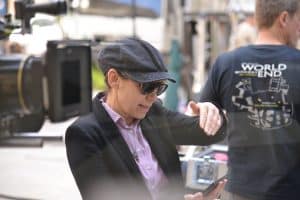 Meanwhile, back in Europe, BERLIN‘s Golden Bear went to Hungarian filmmaker Ildiko Enyedi (right) for her thoughtful and inventive exploration of adult loneliness and alienation BODY AND SOUL. Agnieska Holland won a Silver Bear for her green eco feature SPOOR, and Catalan newcomer Carla Simón went home with a prize for her feature debut SUMMER 1993 tackling the more surprising aspects of life for an orphaned child who goes to live with her cousins. CANNES 2017, the festival’s 70th celebration, also proved to be another strong year for female talent. Claire Simon’s first comedy – looking at love in later life – LET THE SUNSHINE IN was well-received and provided a playful role for Juliette Binoche, which she performed with gusto. Agnès Varda’s entertaining travel piece FACES PLACES took us all round France and finally showed Jean-Luc Godard’s true colours, winning awards at TIFF and Cannes. Newcomers were awarded in the shape of Léa Mysius whose AVA won the SACD prize for its tender exploration of oncoming blindness, and Léonor Séraille whose touching drama about the after-effects of romantic abandonment MONTPARNASSE RENDEZVOUS won the Caméra D’Or.
Meanwhile, back in Europe, BERLIN‘s Golden Bear went to Hungarian filmmaker Ildiko Enyedi (right) for her thoughtful and inventive exploration of adult loneliness and alienation BODY AND SOUL. Agnieska Holland won a Silver Bear for her green eco feature SPOOR, and Catalan newcomer Carla Simón went home with a prize for her feature debut SUMMER 1993 tackling the more surprising aspects of life for an orphaned child who goes to live with her cousins. CANNES 2017, the festival’s 70th celebration, also proved to be another strong year for female talent. Claire Simon’s first comedy – looking at love in later life – LET THE SUNSHINE IN was well-received and provided a playful role for Juliette Binoche, which she performed with gusto. Agnès Varda’s entertaining travel piece FACES PLACES took us all round France and finally showed Jean-Luc Godard’s true colours, winning awards at TIFF and Cannes. Newcomers were awarded in the shape of Léa Mysius whose AVA won the SACD prize for its tender exploration of oncoming blindness, and Léonor Séraille whose touching drama about the after-effects of romantic abandonment MONTPARNASSE RENDEZVOUS won the Caméra D’Or. The Doyenne of French contemporary cinema Isabelle Huppert won Best Actress in LOCARNO 2017 for her performance as a woman who morphs from a meek soul to a force to be reckoned with when she is struck by lightening, in Serge Bozon’s dark comedy MADAME HYDE. Huppert has been winning accolades since the 1970s but she still has to challenge Hollywood’s Ann Doran (1911-2000) on film credits (374) – but there is plenty of time!). Meanwhile, Nastassja Kinski was awarded a Lifetime Achievement Honour for her extensive and eclectic contribution to World cinema (Paris,Texas, Inland Empire, Cat People and Tess to name a few).
The Doyenne of French contemporary cinema Isabelle Huppert won Best Actress in LOCARNO 2017 for her performance as a woman who morphs from a meek soul to a force to be reckoned with when she is struck by lightening, in Serge Bozon’s dark comedy MADAME HYDE. Huppert has been winning accolades since the 1970s but she still has to challenge Hollywood’s Ann Doran (1911-2000) on film credits (374) – but there is plenty of time!). Meanwhile, Nastassja Kinski was awarded a Lifetime Achievement Honour for her extensive and eclectic contribution to World cinema (Paris,Texas, Inland Empire, Cat People and Tess to name a few). With a Jury headed by Annette Bening, VENICE again showed women in a strong light. Away from the Hollywood-fraught main competition, this year’s Orizzonti Award was awarded to Susanna Nicchiarelli’s NICO, 1988, a stunning biopic of the final years of the renowned model and musician Christa Pfaffen, played by a feisty Trine Dyrholm. And Sara Forestier’s Venice Days winning debut M showed how a stuttering girl and her illiterate boyfriend help each other overcome adversity. Charlotte Rampling won the prize for Best Actress for her portrait of strength in the face of her husbands’ imprisonment in Andrea Pallaoro’s HANNAH.
With a Jury headed by Annette Bening, VENICE again showed women in a strong light. Away from the Hollywood-fraught main competition, this year’s Orizzonti Award was awarded to Susanna Nicchiarelli’s NICO, 1988, a stunning biopic of the final years of the renowned model and musician Christa Pfaffen, played by a feisty Trine Dyrholm. And Sara Forestier’s Venice Days winning debut M showed how a stuttering girl and her illiterate boyfriend help each other overcome adversity. Charlotte Rampling won the prize for Best Actress for her portrait of strength in the face of her husbands’ imprisonment in Andrea Pallaoro’s HANNAH. 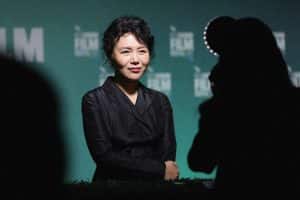 At last but not least, Hong Kong director Vivianne Qu (left/LFF) was awarded the Fei Mei prize at PINGYAO’s inaugural CROUCHING TIGER, HIDDEN DRAGON film festival and the Film Festival of India’s Silver Peacock for her delicately charming feature ANGELS WEAR WHITE that deftly raises the harrowing plight of women facing sexual abuse in the mainland. It seems that this is a hot potato the superpowers of China and US still have in common. But on a positive note, LADYBIRD Greta Gerwig’s first film as a writer and director, has been sweeping the boards critically all over the US and is the buzzworthy comedy drama of 2018 (coming in February). So that’s something else to look forward to. MT
At last but not least, Hong Kong director Vivianne Qu (left/LFF) was awarded the Fei Mei prize at PINGYAO’s inaugural CROUCHING TIGER, HIDDEN DRAGON film festival and the Film Festival of India’s Silver Peacock for her delicately charming feature ANGELS WEAR WHITE that deftly raises the harrowing plight of women facing sexual abuse in the mainland. It seems that this is a hot potato the superpowers of China and US still have in common. But on a positive note, LADYBIRD Greta Gerwig’s first film as a writer and director, has been sweeping the boards critically all over the US and is the buzzworthy comedy drama of 2018 (coming in February). So that’s something else to look forward to. MT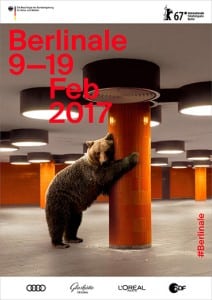



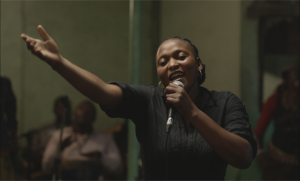
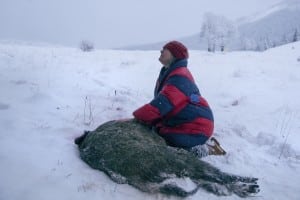
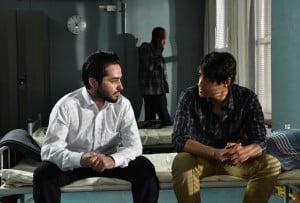
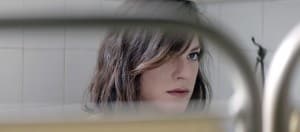
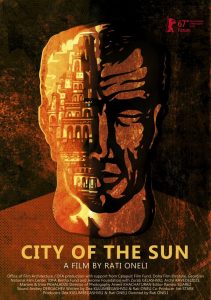 Dir: Rati Oneli | Georgia / USA / Qatar / Netherlands 2017 | Georgian | Doc | 104 min · Colour
Dir: Rati Oneli | Georgia / USA / Qatar / Netherlands 2017 | Georgian | Doc | 104 min · Colour